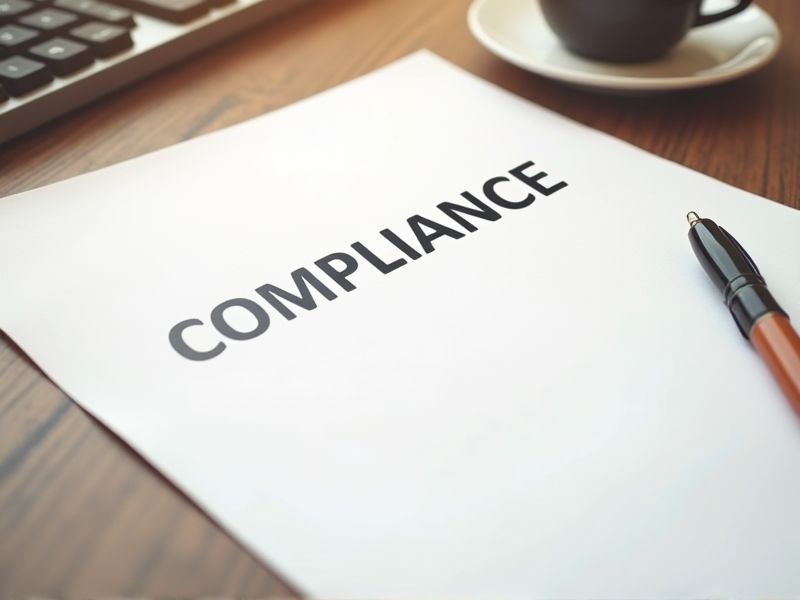
A Compliance Manager in a charity organization plays a crucial role in ensuring adherence to laws, regulations, and ethical standards, directly influencing the organization's credibility and operational integrity. Holding specific certifications equips the Compliance Manager with the necessary knowledge and skills to navigate complex regulatory environments, ultimately safeguarding the organization from legal risks. Certifications like Certified Compliance and Ethics Professional (CCEP) or Nonprofit Compliance Specialist demonstrate a commitment to upholding high professional standards. Highlighted below are important certifications that may benefit a Compliance Manager in a charity organization.
Certified Compliance & Ethics Professional (CCEP)
A charity organization's compliance manager needs the Certified Compliance & Ethics Professional (CCEP) certification to ensure adherence to legal and regulatory standards, reducing the risk of penalties. The certification equips them with the necessary skills to implement effective compliance programs, fostering a culture of ethical behavior. Holding a CCEP credential signifies a commitment to professional development, enhancing trust with donors and stakeholders. This certification can improve the organization's ability to prevent fraud and misconduct, safeguarding its reputation and mission.
Certified Regulatory Compliance Manager (CRCM)
Charity organizations must adhere to various regulatory standards, and a Certified Regulatory Compliance Manager (CRCM) ensures these guidelines are met effectively. The expertise of a CRCM helps in identifying and mitigating compliance risks, safeguarding the organization's reputation. A CRCM brings specialized knowledge crucial for navigating complex legal and financial regulations in the nonprofit sector. Their certification validates proficiency in compliance management, thus enhancing donor trust and operational integrity.
Certified Internal Auditor (CIA)
A Certified Internal Auditor (CIA) brings specialized skills necessary for ensuring effective internal controls and risk management within a charity organization. Their expertise helps identify financial discrepancies and ensures the charity's resources are used efficiently, aligning with compliance requirements. CIAs provide assurance that the organization adheres to regulatory and ethical standards, mitigating legal risks. This certification enhances a Compliance Manager's ability to systematically evaluate operations and enhance transparency for stakeholders.
Certified Fraud Examiner (CFE)
A Certified Fraud Examiner (CFE) brings specialized skills in detecting and preventing fraud, crucial for maintaining transparency within a charity organization. Their expertise ensures compliance with legal and ethical standards, reducing the risk of financial mismanagement. CFEs conduct thorough investigations that enhance accountability, building trust with donors and stakeholders. Their knowledge of fraud deterrence saves the organization from potential financial losses and reputational damage.
Certified Risk Management Professional (CRMP)
A Compliance Manager in a charity organization needs a Certified Risk Management Professional (CRMP) to effectively identify and mitigate potential risks that could jeopardize the organization's mission. The CRMP certification equips managers with tools to ensure that activities align with legal and ethical standards, enhancing the organization's credibility. The charity sector is subject to scrutiny, and holding a CRMP demonstrates a commitment to governance and accountability. This certification helps in navigating complex regulatory environments, minimizing financial and reputational damages.
Certified Anti-Money Laundering Specialist (CAMS)
A Certified Anti-Money Laundering Specialist (CAMS) enhances a compliance manager's ability to detect and prevent illicit financial activities. CAMS certification provides in-depth knowledge of anti-money laundering regulations, which is crucial for safeguarding charity funds from being misused. Charity organizations often handle large volumes of donations, making them potential targets for money laundering schemes. A CAMS-certified compliance manager strengthens the organization's credibility and helps ensure adherence to legal and ethical standards.
Certified Information Privacy Professional (CIPP)
Possessing a CIPP certification equips a compliance manager with a thorough understanding of privacy laws and regulations, essential for protecting donor information in a charity organization. The certification ensures the manager can effectively navigate and implement data protection policies, reducing the risk of privacy breaches. Understanding international privacy standards aids in managing cross-border data activities, vital for charities with global operations. Having a CIPP-certified manager enhances the organization's reputation by demonstrating a commitment to data privacy and ethical information handling.
Nonprofit Leadership Certification
A Nonprofit Leadership Certification equips compliance managers with a deeper understanding of nonprofit regulations, reducing the risk of legal infractions. Enhanced leadership skills improve team coordination and adherence to organizational policies. Certification provides insights into ethical decision-making, essential for maintaining transparency and trust with stakeholders. This education can lead to more efficient resource management, maximizing the impact of donations.
Project Management Professional (PMP)
The PMP certification equips compliance managers in charity organizations with structured methodologies critical for managing complex regulatory projects. Its focus on risk management enhances the ability to anticipate and mitigate compliance-related issues. The certification fosters strong communication skills essential for aligning cross-functional teams around compliance objectives. Applying PMP principles improves resource allocation, ensuring that compliance efforts are both efficient and within budgetary constraints.
Lean Six Sigma Green Belt
A Lean Six Sigma Green Belt equips a Compliance Manager with tools to improve processes, crucial for optimizing resource allocation in a charity organization. Enhanced process efficiency aids in compliance with legal and regulatory standards, reducing the risk of non-compliance penalties. By utilizing data analysis skills gained through Green Belt training, the manager can identify and mitigate inefficiencies, ensuring more donations directly serve the charity's mission. Continuous improvement methodologies foster a culture of accountability and transparency, vital for maintaining donor trust.
Summary
As you enhance your credentials with certifications, you strengthen the trust and credibility of your charity organization. Your expertise can streamline compliance processes, reducing the risk of regulatory breaches. This professional development may also attract more donors and partnerships, as stakeholders observe increased accountability. Improved compliance strategies can lead to more efficient use of resources, positively impacting the organization's mission.
